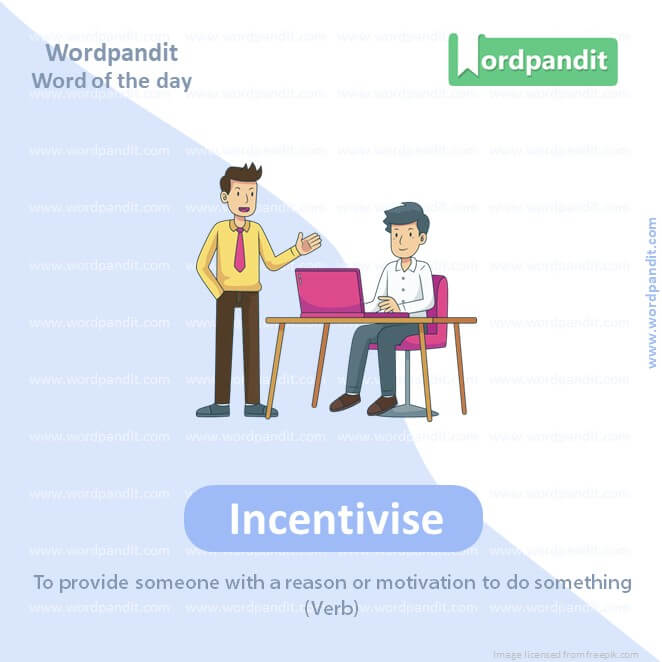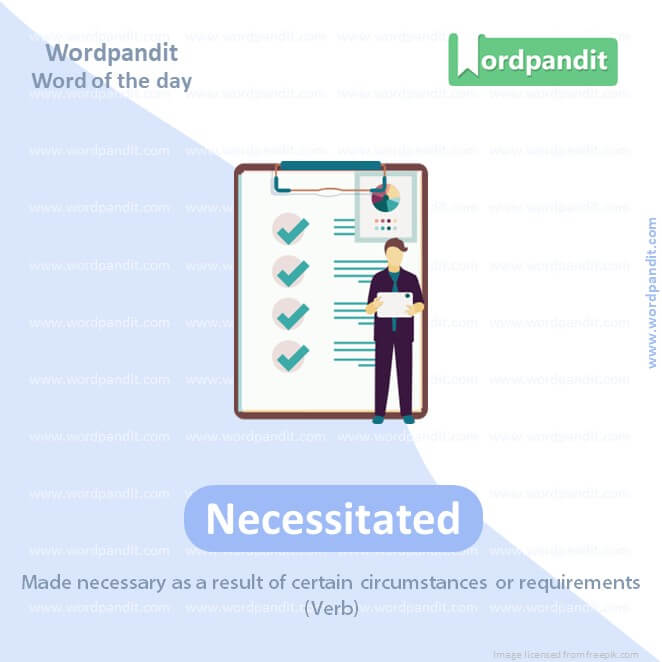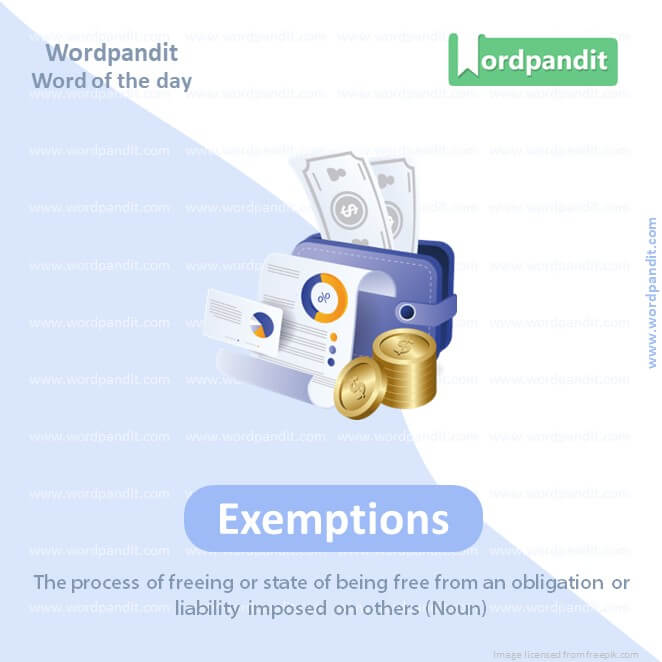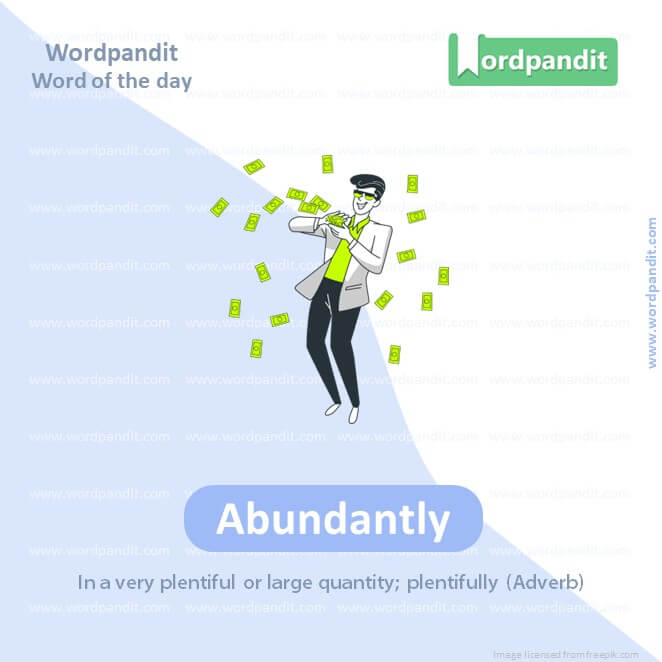Daily Vocabulary Words: List of Daily Used Words in Leading Indian Newspapers
Hi there. Welcome to this special section @ Wordpandit. Our endeavour here is straightforward: highlighting daily vocabulary words that you would come across in leading newspapers in the country. We have included the following newspapers in our selection:
• The Times of India
• The Economic Times
• Hindustan Times
• Mint
• Indian Express
We are putting in extensive work to develop your vocabulary. All you have to do is be regular with this section and check out this post daily. This is your repository of commonly used words; essentially, we are posting a list of daily used words. Hence, this has significant practical application as it teaches you words that are commonly used in leading publications mentioned above.
Visit the website daily to learn words from leading Indian newspapers.

WORD-1: Incentivise
CONTEXT: all its intended objectives were achieved despite covering a short stretch which did not fully incentivise its users.
SOURCE: Indian express
EXPLANATORY PARAGRAPH: Incentivise is like when your parents give you a treat if you clean your room. It means offering a reward or something good to make someone want to do something.
MEANING: To provide someone with a reason or motivation to do something (Verb).
PRONUNCIATION: “in-SEN-ti-vize”.
SYNONYMS: Motivate, Encourage, Induce, Stimulate, Prompt, Spur.
USAGE EXAMPLES:
1. The program is designed to incentivise employees to stay healthy.
2. Tax breaks are used to incentivise investment.
3. Companies often use bonuses to incentivise high performance.
4. Schools may incentivise reading by offering rewards to students.

WORD-2: Necessitated
CONTEXT: The odd-even experiment in 2016 was necessitated during a “public health emergency”.
SOURCE: Indian express
EXPLANATORY PARAGRAPH: Necessitated is like when you have to wear a coat because it’s really cold outside. It means something is needed or must be done.
MEANING: Made necessary as a result of certain circumstances or requirements (Verb).
PRONUNCIATION: “nuh-SES-i-tate-ed”.
SYNONYMS: Required, Demanded, Compelled, Enforced, Obliged, Dictated.
USAGE EXAMPLES:
1. The accident necessitated a call to the police.
2. His injury necessitated surgery.
3. The change in law necessitated new policies.
4. The school’s expansion necessitated hiring more teachers.

WORD-3: Exemptions
CONTEXT: The overall impact would be a mathematical function of the contributory share of the vehicles to the total pollution (varies usually between 30 per cent to 50 per cent) and the proportion of vehicles which stay off the road (<50 per cent depending on exemptions and degree of enforcement).
SOURCE: Indian express
EXPLANATORY PARAGRAPH: Exemptions are like when you don’t have to do chores because you did really well on a test. It means you are freed or excused from doing something that others have to do.
MEANING: The process of freeing or state of being free from an obligation or liability imposed on others (Noun).
PRONUNCIATION: “ig-ZEMP-shuns”.
SYNONYMS: Immunity, Exclusion, Release, Dispensation, Freedom, Relief.
USAGE EXAMPLES:
1. Tax exemptions are available for certain non-profit organizations.
2. Students with medical issues can get exemptions from physical education.
3. There are exemptions for veterans in some government job applications.
4. The new policy offered exemptions to long-term employees.

WORD-4: Abundantly
CONTEXT: it is abundantly clear that editor and writer Anastasia Marks is also a Swiftie.
SOURCE: Indian express
EXPLANATORY PARAGRAPH: Abundantly is like when you have lots and lots of your favorite candy. It means having something in very large amounts.
MEANING: In a very plentiful or large quantity; plentifully (Adverb).
PRONUNCIATION: “uh-BUN-dunt-lee”.
SYNONYMS: Copiously, Profusely, Plentifully, Amply, Generously, Richly.
USAGE EXAMPLES:
1. Flowers were abundantly present in the garden.
2. She abundantly supplied the party with food and drinks.
3. The information was abundantly clear.
4. Wildlife was abundantly visible in the forest.
WORD-5: Salacious
CONTEXT: The Taylor-Kim-Kanye drama had a similar trajectory. Swift says no consent was taken before her name and reference was used by Kanye in a salacious song and music video.
SOURCE: Indian express
EXPLANATORY PARAGRAPH: Salacious is like hearing a secret story that is a bit naughty or shocking. It means something that has too much interest in things like sex and is meant to cause excitement.
MEANING: Having or showing too much interest in sexual matters, often in a way that is shocking or offensive (Adjective).
PRONUNCIATION: “suh-LAY-shus”.
SYNONYMS: Lewd, Obscene, Indecent, Sensational, Provocative, Risqué.
USAGE EXAMPLES:
1. The book was criticized for its salacious content.
2. Salacious rumors were spreading around the office.
3. The media often publish salacious stories to attract readers.
4. He was known for making salacious comments.

WORD-6: Ethnocentrism
CONTEXT: How much of a role did European Christian theology and ethnocentrism play in framing the purpose and methodology of the exercise.
SOURCE: Indian express
EXPLANATORY PARAGRAPH: Ethnocentrism is like thinking the games your family plays are the only good games. It means believing your own group or culture is better or more important than others.
MEANING: The belief in the superiority of one’s own ethnic group or culture (Noun).
PRONUNCIATION: “eth-no-SEN-triz-um”.
SYNONYMS: Cultural bias, Nationalism, Prejudice, Partiality, Bigotry, Chauvinism.
USAGE EXAMPLES:
1. Ethnocentrism can lead to misunderstandings between different cultures.
2. The policy was criticized for its ethnocentrism.
3. Ethnocentrism often hinders global cooperation.
4. His views were shaped by a certain degree of ethnocentrism.
WORD-7: Dissemination
CONTEXT: the Danish Protestant Missions led by German Lutherans “pioneered what became integral parts of Protestant missionary strategy, including translation of the Bible into Indian languages, dissemination of printed tracts, and running schools”.
SOURCE: Indian express
EXPLANATORY PARAGRAPH: Dissemination is like when you share a big bag of candy with all your friends. It means spreading something widely, like information or ideas.
MEANING: The act of spreading something, especially information, widely (Noun).
PRONUNCIATION: “di-sem-ih-NAY-shun”.
SYNONYMS: Distribution, Circulation, Broadcast, Spreading, Propagation, Diffusion.
USAGE EXAMPLES:
1. The dissemination of information is crucial in a crisis.
2. Social media allows for rapid dissemination of news.
3. The organization is involved in the dissemination of educational materials.
4. Effective dissemination strategies are important for public health initiatives.
WORD-8: Accumulated
CONTEXT: The exception is the level of debt GOI and states have accumulated. Unless it’s brought down, we won’t make the most of the current opportunity.
SOURCE: Times of india
EXPLANATORY PARAGRAPH: Accumulated is like when you save all your pocket money over time and it becomes a big amount. It means things have gathered or added up over time.
MEANING: Gathered together or acquired over a period of time (Verb).
PRONUNCIATION: “uh-KYOO-mu-late-ed”.
SYNONYMS: Collected, Amassed, Gathered, Hoarded, Piled up, Congregated.
USAGE EXAMPLES:
1. She accumulated a lot of books over the years.
2. Dust had accumulated on the shelves.
3. Knowledge is accumulated through reading and study.
4. He accumulated wealth throughout his career.
WORD-9: Compensate
CONTEXT: One of the reasons for the high debt level of governments has been the effort they have made to compensate for a low level of private investment.
SOURCE: Times of india
EXPLANATORY PARAGRAPH: Compensate is like when you accidentally break your friend’s toy and then give them your toy to make up for it. It means giving something to make up for something else that was lost or damaged.
MEANING: To make up for something unwelcome or unpleasant by exerting an opposite force or effect (Verb).
PRONUNCIATION: “KOM-pen-sate”.
SYNONYMS: Reimburse, Repay, Make up for, Offset, Remunerate, Redress.
USAGE EXAMPLES:
1. The company agreed to compensate customers for the inconvenience.
2. She worked extra hours to compensate for the time off.
3. Trees were planted to compensate for the deforestation.
4. He tried to compensate for his lack of experience with hard work.
WORD-10 Constraints
CONTEXT.: this space being created, high interest rates will limit economic potential the current moment offers. Fiscal constraints have earlier derailed economic growth momentum.
SOURCE: Times of india
EXPLANATORY PARAGRAPH: Constraints are like rules in a game that tell you what you can’t do. They are limits or restrictions on what you can do.
MEANING: Limitations or restrictions (Noun).
PRONUNCIATION: “kon-STRAYNTS”.
SYNONYMS: Restrictions, Limitations, Boundaries, Confinements, Inhibitions, Restraints.
USAGE EXAMPLES:
1. Budget constraints limited the scope of the project.
2. The artist worked within the constraints of a small studio.
3. Time constraints made it difficult to complete the task.
4. The legal constraints on the company were significant.
Vocabulary Importance
In the realm of language learning, understanding ‘vocabulary importance’ is a fundamental concept. Words are the building blocks of language and a rich vocabulary fuels effective and persuasive communication. However, embracing ‘vocabulary importance’ involves more than just acknowledging its role – it requires you to integrate it into your learning strategy.
To truly grasp ‘vocabulary importance’, expose yourself to a variety of reading and listening activities. Whether it’s reading novels, engaging with podcasts, or watching films in your the profound impact of having a robust vocabulary arsenal and will illuminate the practical ‘vocabulary importance.’
Additionally, recognizing ‘vocabulary importance’ necessitates an active approach to vocabulary acquisition. Regularly dedicate time to learning new words. Use flashcards, word lists, language apps, or even set a ‘word of the day’ to maintain a steady flow of vocabulary learning.
Incorporating the learnt vocabulary into your speech and writing is non-negotiable when understanding ‘vocabulary importance’. Regular usage not only enhances vocabulary retention, but it also uncovers the magic of eloquent expression that a blossoming vocabulary can yield.
It’s also beneficial to lean on memory aids in recognizing ‘vocabulary importance’. Associating words with images, stories or personal anecdotes creates strong memory hooks, enhancing vocabulary recall and solidifying the understanding of ‘vocabulary importance’.
To sum it up, ‘vocabulary importance’ is not just a theory to be noted, but a mantra to be embraced in your language learning journey. Engage with a wide variety of resources, actively learn and use new words, and utilize effective recall techniques. As you uncover the depths of ‘vocabulary importance’, you’ll realize that every new word is a fresh shade on your language palette, painting your communication canvas with hues of eloquence, clarity, and confidence.













